【名师面对面】2015中考精英英语(外研版)总复习课件:第36讲 疑问句和倒装句(共28张PPT)
文档属性
| 名称 | 【名师面对面】2015中考精英英语(外研版)总复习课件:第36讲 疑问句和倒装句(共28张PPT) |
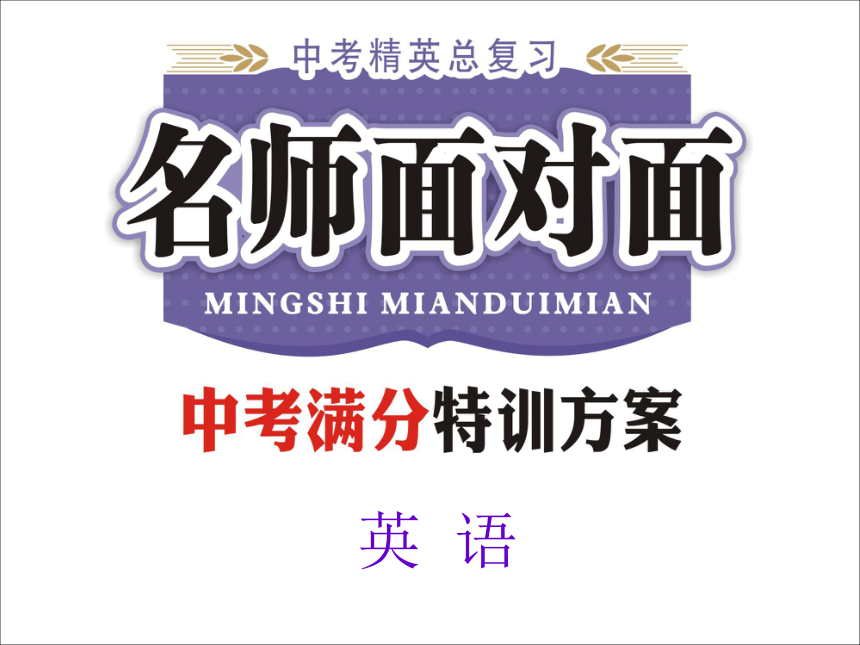
|
|
| 格式 | zip | ||
| 文件大小 | 388.1KB | ||
| 资源类型 | 教案 | ||
| 版本资源 | 外研版 | ||
| 科目 | 英语 | ||
| 更新时间 | 2014-12-19 00:00:00 | ||
图片预览

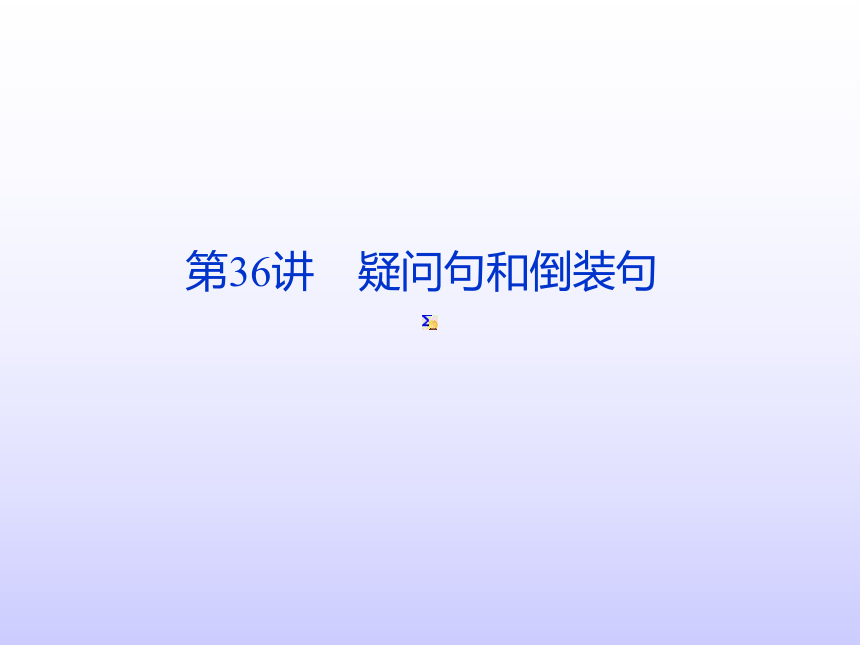
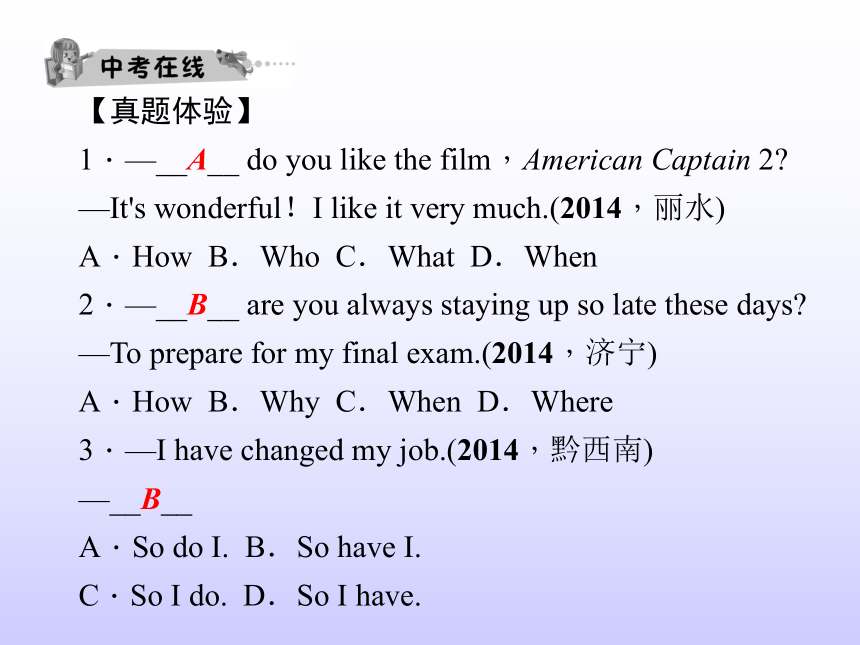

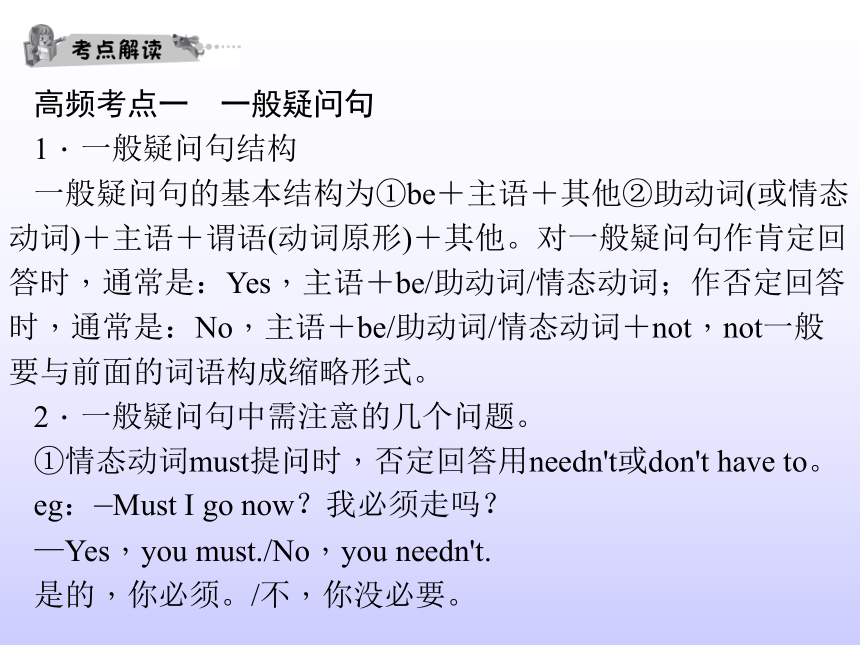
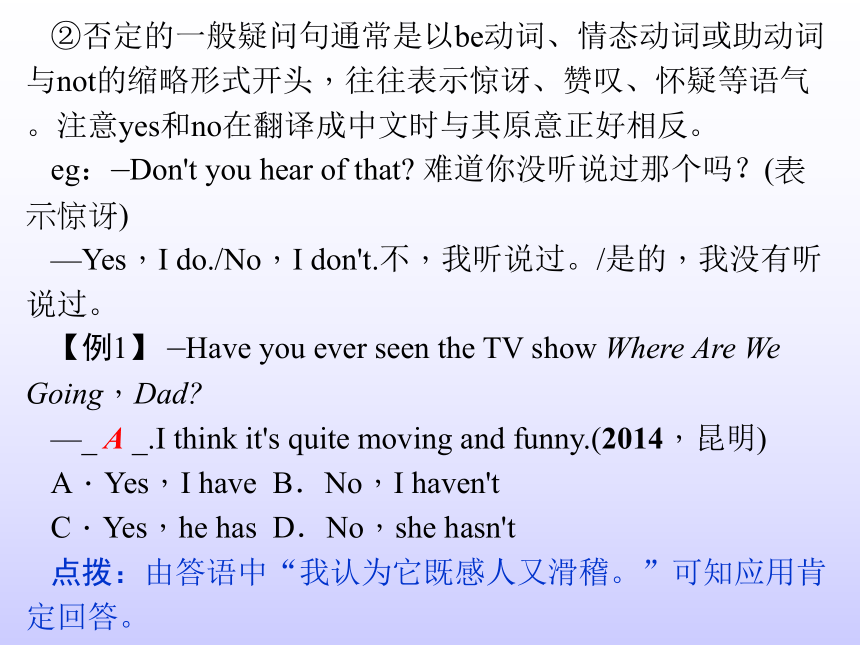
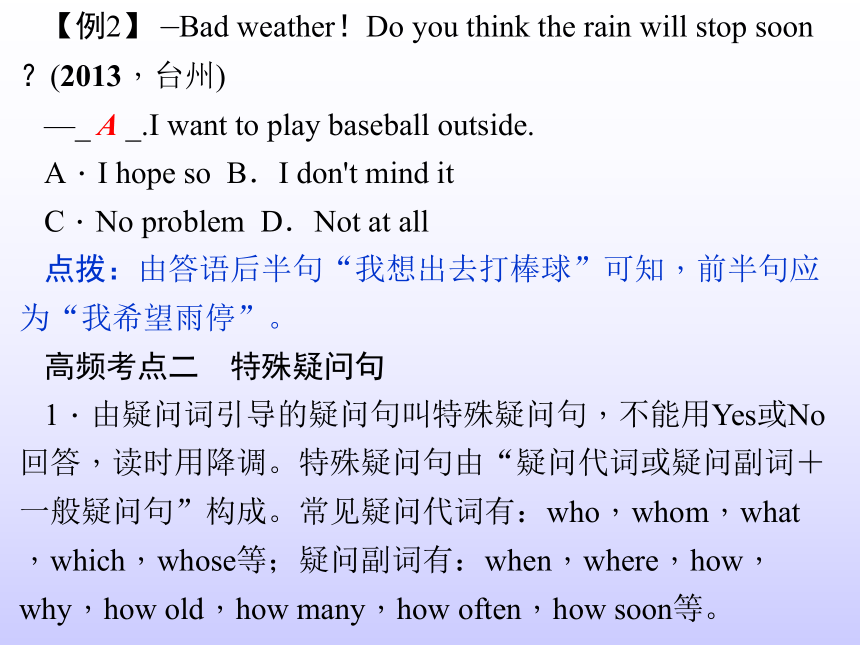
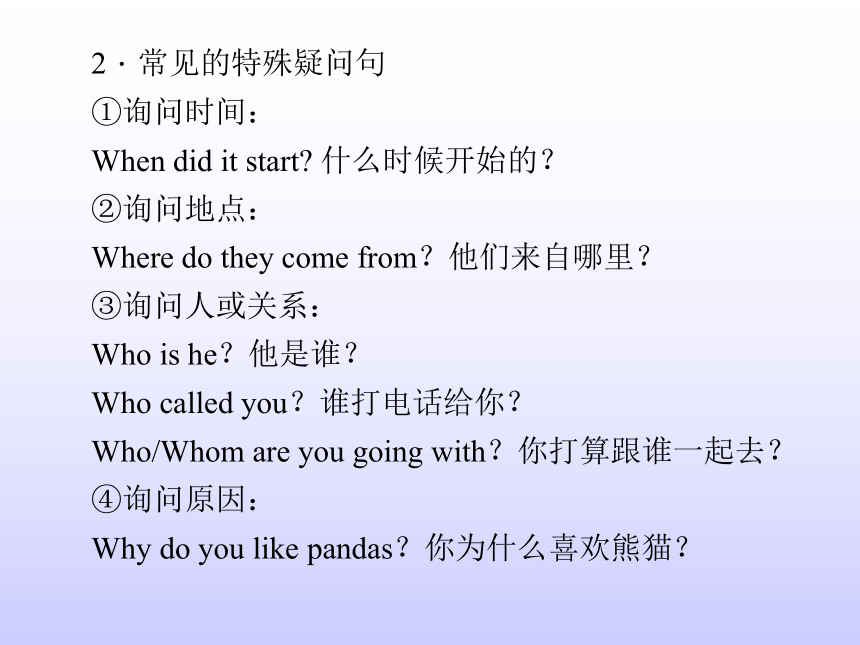
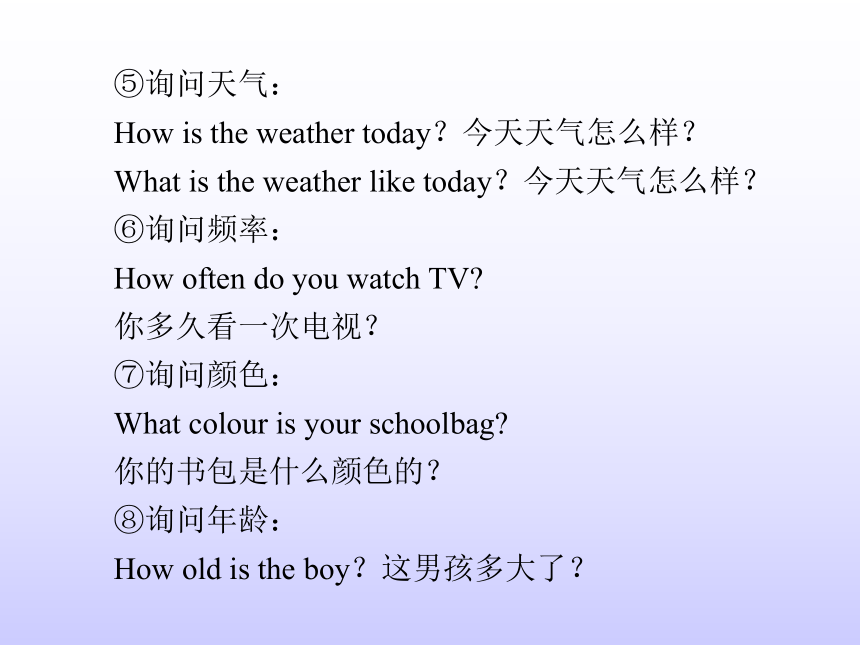
文档简介
课件28张PPT。英 语第36讲 疑问句和倒装句【真题体验】
1.—__A__ do you like the film,American Captain 2?
—It's wonderful!I like it very much.(2014,丽水)
A.How B.Who C.What D.When
2.—__B__ are you always staying up so late these days?
—To prepare for my final exam.(2014,济宁)
A.How B.Why C.When D.Where
3.—I have changed my job.(2014,黔西南)
—__B__
A.So do I. B.So have I.
C.So I do. D.So I have.4.There __C__ more visitors in Dongying this year because 2014 City Landscaping Exposition of Shangdong Province(山东省城市园林绿化博览会) will be held here on September 1st.(2014,东营)
A.is B.are
C.will be D.is going to have
5.—Judy's never been late for school,__B__ she?(2014,达州)
—________.She is always the first to get to school every morning.
A.is;Yes B.has;No C.isn't;Yes D.hasn't;No
【考点梳理】
1.疑问句的种类、结构和疑问词的选择。
2.倒装句的结构及其意思。高频考点一 一般疑问句
1.一般疑问句结构
一般疑问句的基本结构为①be+主语+其他②助动词(或情态动词)+主语+谓语(动词原形)+其他。对一般疑问句作肯定回答时,通常是:Yes,主语+be/助动词/情态动词;作否定回答时,通常是:No,主语+be/助动词/情态动词+not,not一般要与前面的词语构成缩略形式。
2.一般疑问句中需注意的几个问题。
①情态动词must提问时,否定回答用needn't或don't have to。
eg:—Must I go now?我必须走吗?
—Yes,you must./No,you needn't.
是的,你必须。/不,你没必要。②否定的一般疑问句通常是以be动词、情态动词或助动词与not的缩略形式开头,往往表示惊讶、赞叹、怀疑等语气。注意yes和no在翻译成中文时与其原意正好相反。
eg:—Don't you hear of that? 难道你没听说过那个吗?(表示惊讶)
—Yes,I do./No,I don't.不,我听说过。/是的,我没有听说过。
【例1】 —Have you ever seen the TV show Where Are We Going,Dad?
—_ A _.I think it's quite moving and funny.(2014,昆明)
A.Yes,I have B.No,I haven't
C.Yes,he has D.No,she hasn't
点拨:由答语中“我认为它既感人又滑稽。”可知应用肯定回答。【例2】 —Bad weather!Do you think the rain will stop soon?(2013,台州)
—_ A _.I want to play baseball outside.
A.I hope so B.I don't mind it
C.No problem D.Not at all
点拨:由答语后半句“我想出去打棒球”可知,前半句应为“我希望雨停”。
高频考点二 特殊疑问句
1.由疑问词引导的疑问句叫特殊疑问句,不能用Yes或No回答,读时用降调。特殊疑问句由“疑问代词或疑问副词+一般疑问句”构成。常见疑问代词有:who,whom,what,which,whose等;疑问副词有:when,where,how,why,how old,how many,how often,how soon等。2.常见的特殊疑问句
①询问时间:
When did it start? 什么时候开始的?
②询问地点:
Where do they come from?他们来自哪里?
③询问人或关系:
Who is he?他是谁?
Who called you?谁打电话给你?
Who/Whom are you going with?你打算跟谁一起去?
④询问原因:
Why do you like pandas?你为什么喜欢熊猫?⑤询问天气:
How is the weather today?今天天气怎么样?
What is the weather like today?今天天气怎么样?
⑥询问频率:
How often do you watch TV?
你多久看一次电视?
⑦询问颜色:
What colour is your schoolbag?
你的书包是什么颜色的?
⑧询问年龄:
How old is the boy?这男孩多大了?⑨询问距离:
How far is it from your home to school?
从你家到学校有多远?
⑩询问数量:
How many apples do we need?
我们需要多少苹果?
How much honey do we need?
我们需要多少蜂蜜?
?询问价格:
How much is the T-shirt?这件T恤衫多少钱?【例3】 —Excuse me,Sir._ C _ is it from here to the nearest shopping mall?
—Well,only about five minutes' walk.(2014,湖州)
A.How often B.How long
C.How far D.How soon
点拨:how often“多久”,对频率提问;how long“多长时间”,用for或since引导的时间状语来回答;how far“多远”,对距离提问;how soon“还要多久才……”,一般用于将来时,用in引导的时间状语来回答。由答句可知,提问的是距离。高频考点三 选择疑问句
提出两种或两种以上的情况,要求对方选择一种情况回答的问句叫选择疑问句。选择疑问句中两种或两种以上的情况用or连接,回答时不能用yes或no,要用一个完整的句子或其省略形式。语调一般是前升后降。选择疑问句可以分为一般选择疑问句和特殊选择疑问句两种。
①一般选择疑问句:一般疑问句+or+被选择的部分?
eg:—Do you like apples or pears?你喜欢苹果还是梨?
—I like pears.我喜欢梨子。
②特殊选择疑问句:特殊疑问句+A or B?
eg:—Which would you like better,tea or coffee?你喜欢什么,茶还是咖啡?
—I'd like coffee.我喜欢咖啡。【例4】 —Is your friend a boy or a girl?
—_ B _.
A.No,she isn't B.A girl
C.The girl D.Yes,she is
点拨:选择疑问句不能用Yes或No回答,排除A、D项;根据问句,回答用a girl。高频考点四 反意疑问句
1.反意疑问句是附在陈述句之后,对陈述句所说的事实或观点提出疑问的句子。反意疑问句有两部分组成,前一部分为陈述句,后一部分为简短的一般疑问句。若前一部分为肯定句,后一部分就要用否定形式,而且必须用缩略形式;若前一部分用否定形式,后一部分就用肯定形式。即:“前肯后否,前否后肯”。两部分的人称和时态要一致。
2.常见的特殊的反意疑问句
①当陈述部分含有否定意义的词如 hardly,few,little,no,nobody,no one,nothing等时,附加疑问部分须用肯定形式。但若陈述部分含有带否定前缀如im-,un-,dis-等的派生词,仍作为肯定结构,附加疑问句部分用否定式。②I am…反意疑问句附加疑问句部分应为aren't I。
③如果陈述部分是肯定或否定的祈使句,疑问部分须用 will you。
④当陈述部分是Let's do sth.时,疑问部分须用shall we来反问;而当陈述部分是Let sb.do sth.时,疑问部分用will you 来反问。
⑤陈述部分的谓语是used to 时,附加疑问句部分用“didn't+主语”或“usedn't+主语”。如:
He used to go to bed late,didn't /usedn't he?他过去常常睡觉晚,是吗?
⑥need 的反意疑问句
?need是实义动词。如:
We need to come earlier,don't we?我们需要来早点,对吗??need是情态动词。如:
We need't come so early,need we?我们不必来那么早,对吗?
⑦当陈述部分主语是不定代词 nobody,somebody,no one时,疑问句部分须用复数代词they,也可以用he;当陈述部分主语是不定代词 nothing,something时,疑问部分须用代词it。
⑧若陈述部分为there be 句型,附加疑问部分仍用there。
⑨主从复合句的反意疑问句附加疑问句部分的助动词与人称应与主句的谓语动词和人称保持一致。若宾语从句的主语为“I think/suppose/believe”等表示说话人的看法,反意疑问句的疑问部分应与宾语从句一致。3.反意疑问句的回答,无论问题的提法如何,如果事实是肯定的,就用yes,事实是否定的,就要用no。要特别注意陈述句部分是否定结构,反意疑问句部分用肯定式提问时,回答yes或no与汉语正好相反。这种省略回答的yes要译成“不”,no要译成“是”。
例:—He likes playing football,doesn't he?他喜欢踢足球,是吗?
—Yes,he does./No,he doesn't.是的。/不是。
—His sister didn't attend the meeting,did she?他妹妹没有参加会议,是吗?
—Yes,she did./No,she didn't.不,她参加了。/是的,她没参加。【例5】 There is little water in the bottle,__ C _?
A.is it B.isn't it C.is there D.isn't there
点拨:本题考查反意疑问句的用法。句子由there引导,反意疑问句也应由there构成,故排除选项A和B;little意为“很少,几乎没有”,表示否定意义,故反意疑问句用肯定形式。
【例6】 It's sunny today,let's fly kites in the park,__ shall we _?
点拨:以Let's 引导的反意疑问句应用shall we。高频考点五 倒装句的用法
英语句子的自然语序是主语在前,谓语动词在后。如果把谓语动词放在之前,就构成了倒装句。下面是几种倒装句的具体形式:
1.
①这两种结构常用来说明前面所说的情况也同样适用于后面的人或物,意思是“某人(物)也(不)是这样”。这种结构中的助动词/be动词/情态动词在形式上与前句的谓语保持一致,而其单复数形式则由后句的主语决定。如:
Lucy is a good student,so is Lily.
露西是个好学生,莉莉也是。 ①这两种结构常用来说明前面所说的情况也同样适用于后面的人或物,意思是“某人(物)也(不)是这样”。这种结构中的助动词/be动词/情态动词在形式上与前句的谓语保持一致,而其单复数形式则由后句的主语决定。如:
Lucy is a good student,so is Lily.
露西是个好学生,莉莉也是。
②这两种结构的不同点是:
“so+助动词/be动词/情态动词+主语”依附于肯定句,表示前边的肯定情况也适合后边的人(物),意为“……也……”。“neither+助动词/be动词/情态动词+主语”依附于否定句,表示前边的否定情况也适合后边的人(物),意为“……也不……”。如:
Tom watched TV last night,so did Ann.
汤姆昨晚看电视了,安也看了。
Mary didn't watch TV last night,neither did Jim.玛丽昨晚没有看电视,吉姆也没看。
【注意】若对前面所说的事实加以肯定时,应用so+主语+be/助动词/情态动词。此时前后两个句子的主语为同一个人或物。2.there be 句型
there be 句型表示“存在”,是一个主语在be动词后面的倒装句。如:
There is a tree in front of the building.建筑前有一棵树。
3.以副词开头的倒装句
在以here,there,out,in,down,away等表示方位的副词开头的句子中,如果主语是名词,要用倒装句;如果主语是代词,则不需倒装。因此,谓语动词的形式由位于倒装句句尾的主语决定。如:
There comes the bus.公共汽车来了。【例7】 —I'm not going swimming this afternoon.(2014,宜宾)
—_ C _.I have to help my mother do some cleaning.
A.So am I B.So I am
C.Neither am I D.Neither I am
点拨:第一句句意为“今天下午我将不会去游泳。”为否定句,答句第二句为“我不得不帮妈妈做清洁。”可知“也不会去”。
【例8】 Between the two hills _ D _ a deep river.
A.are B.have C.has D.is
点拨:本句考查倒装句,结合英语提示可知正确语序为“A deep river is between the two hills.”意为“在这两座山之间有一条河。”1.—Last night I didn't watch the TV show,A Bite of China 2.(2014,漳州)
—__C__ did I.I was preparing for today's test then.
A.So B.Either C.Neither D.Or
2.Thanks to the 2014 Winter Olympics,Sochi is well-known,__A__?(2014,昆明)
A.isn't it B.was it C.is it D.wasn't it
3.Across from my home,__C__ a shop which sells things from foreign countries.(2014,济宁)
A.it is B.it has C.there is D.that is4.—__D__ will your father come from Beijing?
—In two days.(2014,泰安)
A.How often B.How long
C.How far D.How soon
5.—Has your mother ever been to London?
—Yes,and __A__.We went together.(2014,白银)
A.so have I B.so I have
C.neither have I D.neither I have
6.—__B__ do you like Huo Zun's Roll of Bead Curtain(卷珠帘)?
—Very much.You know I love songs that both have great lyrics and beautiful music.(2014,东营)
A.Why B.How C.When D.What7.—__C__ people are there in your family?
—Three.(2014,北京)
A.How often B.How long
C.How many D.How much
8.—How often do you chat with your friends online?
—__B__.I'm busy with my study.(2013,菏泽)
A.Only one month B.About twice a month
C.Almost every day D.Maybe in two weeks
9.—Do you know __A__ I saw yesterday?
—It was my favourite star,Jackie!(2013,江西)
A.whom B.when C.where D.how10.—Sam didn't go to school yesterday,did he?
—__C__.He was ill yesterday.(2013,宜宾)
A.Yes,he did B.No,he did
C.No,he didn't D.Yes,he didn't
11.—__A__ bowl of mutton soup would you like?
—A big bowl,please.(2013,兰州)
A.What size B.What big
C.How much D.How size
12.There's little important news in the newspaper today,__B__?(2013,十堰)
A.isn't there B.is there
C.is it D.are there13.Our town has changed a lot,__B__ .(2013,安顺)
A.so he has B.so has his
C.so is hers D.so has he
14.I can't play the piano,and __A__.(2012,黄石)
A.neither can my sister
B.my sister can't,too
C.so can't my sister
D.can my sister,either
15.—__A__ can I get the book if I order it today?
—In a week.(2012,陕西)
A.How soon B.How long
C.How much D.How many
1.—__A__ do you like the film,American Captain 2?
—It's wonderful!I like it very much.(2014,丽水)
A.How B.Who C.What D.When
2.—__B__ are you always staying up so late these days?
—To prepare for my final exam.(2014,济宁)
A.How B.Why C.When D.Where
3.—I have changed my job.(2014,黔西南)
—__B__
A.So do I. B.So have I.
C.So I do. D.So I have.4.There __C__ more visitors in Dongying this year because 2014 City Landscaping Exposition of Shangdong Province(山东省城市园林绿化博览会) will be held here on September 1st.(2014,东营)
A.is B.are
C.will be D.is going to have
5.—Judy's never been late for school,__B__ she?(2014,达州)
—________.She is always the first to get to school every morning.
A.is;Yes B.has;No C.isn't;Yes D.hasn't;No
【考点梳理】
1.疑问句的种类、结构和疑问词的选择。
2.倒装句的结构及其意思。高频考点一 一般疑问句
1.一般疑问句结构
一般疑问句的基本结构为①be+主语+其他②助动词(或情态动词)+主语+谓语(动词原形)+其他。对一般疑问句作肯定回答时,通常是:Yes,主语+be/助动词/情态动词;作否定回答时,通常是:No,主语+be/助动词/情态动词+not,not一般要与前面的词语构成缩略形式。
2.一般疑问句中需注意的几个问题。
①情态动词must提问时,否定回答用needn't或don't have to。
eg:—Must I go now?我必须走吗?
—Yes,you must./No,you needn't.
是的,你必须。/不,你没必要。②否定的一般疑问句通常是以be动词、情态动词或助动词与not的缩略形式开头,往往表示惊讶、赞叹、怀疑等语气。注意yes和no在翻译成中文时与其原意正好相反。
eg:—Don't you hear of that? 难道你没听说过那个吗?(表示惊讶)
—Yes,I do./No,I don't.不,我听说过。/是的,我没有听说过。
【例1】 —Have you ever seen the TV show Where Are We Going,Dad?
—_ A _.I think it's quite moving and funny.(2014,昆明)
A.Yes,I have B.No,I haven't
C.Yes,he has D.No,she hasn't
点拨:由答语中“我认为它既感人又滑稽。”可知应用肯定回答。【例2】 —Bad weather!Do you think the rain will stop soon?(2013,台州)
—_ A _.I want to play baseball outside.
A.I hope so B.I don't mind it
C.No problem D.Not at all
点拨:由答语后半句“我想出去打棒球”可知,前半句应为“我希望雨停”。
高频考点二 特殊疑问句
1.由疑问词引导的疑问句叫特殊疑问句,不能用Yes或No回答,读时用降调。特殊疑问句由“疑问代词或疑问副词+一般疑问句”构成。常见疑问代词有:who,whom,what,which,whose等;疑问副词有:when,where,how,why,how old,how many,how often,how soon等。2.常见的特殊疑问句
①询问时间:
When did it start? 什么时候开始的?
②询问地点:
Where do they come from?他们来自哪里?
③询问人或关系:
Who is he?他是谁?
Who called you?谁打电话给你?
Who/Whom are you going with?你打算跟谁一起去?
④询问原因:
Why do you like pandas?你为什么喜欢熊猫?⑤询问天气:
How is the weather today?今天天气怎么样?
What is the weather like today?今天天气怎么样?
⑥询问频率:
How often do you watch TV?
你多久看一次电视?
⑦询问颜色:
What colour is your schoolbag?
你的书包是什么颜色的?
⑧询问年龄:
How old is the boy?这男孩多大了?⑨询问距离:
How far is it from your home to school?
从你家到学校有多远?
⑩询问数量:
How many apples do we need?
我们需要多少苹果?
How much honey do we need?
我们需要多少蜂蜜?
?询问价格:
How much is the T-shirt?这件T恤衫多少钱?【例3】 —Excuse me,Sir._ C _ is it from here to the nearest shopping mall?
—Well,only about five minutes' walk.(2014,湖州)
A.How often B.How long
C.How far D.How soon
点拨:how often“多久”,对频率提问;how long“多长时间”,用for或since引导的时间状语来回答;how far“多远”,对距离提问;how soon“还要多久才……”,一般用于将来时,用in引导的时间状语来回答。由答句可知,提问的是距离。高频考点三 选择疑问句
提出两种或两种以上的情况,要求对方选择一种情况回答的问句叫选择疑问句。选择疑问句中两种或两种以上的情况用or连接,回答时不能用yes或no,要用一个完整的句子或其省略形式。语调一般是前升后降。选择疑问句可以分为一般选择疑问句和特殊选择疑问句两种。
①一般选择疑问句:一般疑问句+or+被选择的部分?
eg:—Do you like apples or pears?你喜欢苹果还是梨?
—I like pears.我喜欢梨子。
②特殊选择疑问句:特殊疑问句+A or B?
eg:—Which would you like better,tea or coffee?你喜欢什么,茶还是咖啡?
—I'd like coffee.我喜欢咖啡。【例4】 —Is your friend a boy or a girl?
—_ B _.
A.No,she isn't B.A girl
C.The girl D.Yes,she is
点拨:选择疑问句不能用Yes或No回答,排除A、D项;根据问句,回答用a girl。高频考点四 反意疑问句
1.反意疑问句是附在陈述句之后,对陈述句所说的事实或观点提出疑问的句子。反意疑问句有两部分组成,前一部分为陈述句,后一部分为简短的一般疑问句。若前一部分为肯定句,后一部分就要用否定形式,而且必须用缩略形式;若前一部分用否定形式,后一部分就用肯定形式。即:“前肯后否,前否后肯”。两部分的人称和时态要一致。
2.常见的特殊的反意疑问句
①当陈述部分含有否定意义的词如 hardly,few,little,no,nobody,no one,nothing等时,附加疑问部分须用肯定形式。但若陈述部分含有带否定前缀如im-,un-,dis-等的派生词,仍作为肯定结构,附加疑问句部分用否定式。②I am…反意疑问句附加疑问句部分应为aren't I。
③如果陈述部分是肯定或否定的祈使句,疑问部分须用 will you。
④当陈述部分是Let's do sth.时,疑问部分须用shall we来反问;而当陈述部分是Let sb.do sth.时,疑问部分用will you 来反问。
⑤陈述部分的谓语是used to 时,附加疑问句部分用“didn't+主语”或“usedn't+主语”。如:
He used to go to bed late,didn't /usedn't he?他过去常常睡觉晚,是吗?
⑥need 的反意疑问句
?need是实义动词。如:
We need to come earlier,don't we?我们需要来早点,对吗??need是情态动词。如:
We need't come so early,need we?我们不必来那么早,对吗?
⑦当陈述部分主语是不定代词 nobody,somebody,no one时,疑问句部分须用复数代词they,也可以用he;当陈述部分主语是不定代词 nothing,something时,疑问部分须用代词it。
⑧若陈述部分为there be 句型,附加疑问部分仍用there。
⑨主从复合句的反意疑问句附加疑问句部分的助动词与人称应与主句的谓语动词和人称保持一致。若宾语从句的主语为“I think/suppose/believe”等表示说话人的看法,反意疑问句的疑问部分应与宾语从句一致。3.反意疑问句的回答,无论问题的提法如何,如果事实是肯定的,就用yes,事实是否定的,就要用no。要特别注意陈述句部分是否定结构,反意疑问句部分用肯定式提问时,回答yes或no与汉语正好相反。这种省略回答的yes要译成“不”,no要译成“是”。
例:—He likes playing football,doesn't he?他喜欢踢足球,是吗?
—Yes,he does./No,he doesn't.是的。/不是。
—His sister didn't attend the meeting,did she?他妹妹没有参加会议,是吗?
—Yes,she did./No,she didn't.不,她参加了。/是的,她没参加。【例5】 There is little water in the bottle,__ C _?
A.is it B.isn't it C.is there D.isn't there
点拨:本题考查反意疑问句的用法。句子由there引导,反意疑问句也应由there构成,故排除选项A和B;little意为“很少,几乎没有”,表示否定意义,故反意疑问句用肯定形式。
【例6】 It's sunny today,let's fly kites in the park,__ shall we _?
点拨:以Let's 引导的反意疑问句应用shall we。高频考点五 倒装句的用法
英语句子的自然语序是主语在前,谓语动词在后。如果把谓语动词放在之前,就构成了倒装句。下面是几种倒装句的具体形式:
1.
①这两种结构常用来说明前面所说的情况也同样适用于后面的人或物,意思是“某人(物)也(不)是这样”。这种结构中的助动词/be动词/情态动词在形式上与前句的谓语保持一致,而其单复数形式则由后句的主语决定。如:
Lucy is a good student,so is Lily.
露西是个好学生,莉莉也是。 ①这两种结构常用来说明前面所说的情况也同样适用于后面的人或物,意思是“某人(物)也(不)是这样”。这种结构中的助动词/be动词/情态动词在形式上与前句的谓语保持一致,而其单复数形式则由后句的主语决定。如:
Lucy is a good student,so is Lily.
露西是个好学生,莉莉也是。
②这两种结构的不同点是:
“so+助动词/be动词/情态动词+主语”依附于肯定句,表示前边的肯定情况也适合后边的人(物),意为“……也……”。“neither+助动词/be动词/情态动词+主语”依附于否定句,表示前边的否定情况也适合后边的人(物),意为“……也不……”。如:
Tom watched TV last night,so did Ann.
汤姆昨晚看电视了,安也看了。
Mary didn't watch TV last night,neither did Jim.玛丽昨晚没有看电视,吉姆也没看。
【注意】若对前面所说的事实加以肯定时,应用so+主语+be/助动词/情态动词。此时前后两个句子的主语为同一个人或物。2.there be 句型
there be 句型表示“存在”,是一个主语在be动词后面的倒装句。如:
There is a tree in front of the building.建筑前有一棵树。
3.以副词开头的倒装句
在以here,there,out,in,down,away等表示方位的副词开头的句子中,如果主语是名词,要用倒装句;如果主语是代词,则不需倒装。因此,谓语动词的形式由位于倒装句句尾的主语决定。如:
There comes the bus.公共汽车来了。【例7】 —I'm not going swimming this afternoon.(2014,宜宾)
—_ C _.I have to help my mother do some cleaning.
A.So am I B.So I am
C.Neither am I D.Neither I am
点拨:第一句句意为“今天下午我将不会去游泳。”为否定句,答句第二句为“我不得不帮妈妈做清洁。”可知“也不会去”。
【例8】 Between the two hills _ D _ a deep river.
A.are B.have C.has D.is
点拨:本句考查倒装句,结合英语提示可知正确语序为“A deep river is between the two hills.”意为“在这两座山之间有一条河。”1.—Last night I didn't watch the TV show,A Bite of China 2.(2014,漳州)
—__C__ did I.I was preparing for today's test then.
A.So B.Either C.Neither D.Or
2.Thanks to the 2014 Winter Olympics,Sochi is well-known,__A__?(2014,昆明)
A.isn't it B.was it C.is it D.wasn't it
3.Across from my home,__C__ a shop which sells things from foreign countries.(2014,济宁)
A.it is B.it has C.there is D.that is4.—__D__ will your father come from Beijing?
—In two days.(2014,泰安)
A.How often B.How long
C.How far D.How soon
5.—Has your mother ever been to London?
—Yes,and __A__.We went together.(2014,白银)
A.so have I B.so I have
C.neither have I D.neither I have
6.—__B__ do you like Huo Zun's Roll of Bead Curtain(卷珠帘)?
—Very much.You know I love songs that both have great lyrics and beautiful music.(2014,东营)
A.Why B.How C.When D.What7.—__C__ people are there in your family?
—Three.(2014,北京)
A.How often B.How long
C.How many D.How much
8.—How often do you chat with your friends online?
—__B__.I'm busy with my study.(2013,菏泽)
A.Only one month B.About twice a month
C.Almost every day D.Maybe in two weeks
9.—Do you know __A__ I saw yesterday?
—It was my favourite star,Jackie!(2013,江西)
A.whom B.when C.where D.how10.—Sam didn't go to school yesterday,did he?
—__C__.He was ill yesterday.(2013,宜宾)
A.Yes,he did B.No,he did
C.No,he didn't D.Yes,he didn't
11.—__A__ bowl of mutton soup would you like?
—A big bowl,please.(2013,兰州)
A.What size B.What big
C.How much D.How size
12.There's little important news in the newspaper today,__B__?(2013,十堰)
A.isn't there B.is there
C.is it D.are there13.Our town has changed a lot,__B__ .(2013,安顺)
A.so he has B.so has his
C.so is hers D.so has he
14.I can't play the piano,and __A__.(2012,黄石)
A.neither can my sister
B.my sister can't,too
C.so can't my sister
D.can my sister,either
15.—__A__ can I get the book if I order it today?
—In a week.(2012,陕西)
A.How soon B.How long
C.How much D.How many
同课章节目录
- 词法
- 名词
- 动词和动词短语
- 动词语态
- 动词时态
- 助动词和情态动词
- 非谓语动词
- 冠词
- 代词
- 数词和量词
- 形容词副词及其比较等级
- 介词和介词短语
- 连词和感叹词
- 构词法
- 相似、相近词比较
- 句法
- 陈述句
- 一般疑问句和否定疑问句
- 特殊疑问句及选择疑问句
- 反意疑问句
- 存在句(There be句型)
- 宾语从句
- 定语从句
- 状语从句
- 主谓一致问题
- 简单句
- 并列句
- 复合句
- 主谓一致
- 主、表语从句
- 名词性从句
- 直接引语和间接引语
- 虚拟语气
- 感叹句
- 强调句
- 倒装句
- 祈使句
- 句子的成分
- 句子的分类
- 题型专区
- 单项选择部分
- 易错题
- 完形填空
- 阅读理解
- 词汇练习
- 听说训练
- 句型转换
- 补全对话
- 短文改错
- 翻译
- 书面表达
- 任务型阅读
- 语法填空
- 其他资料
